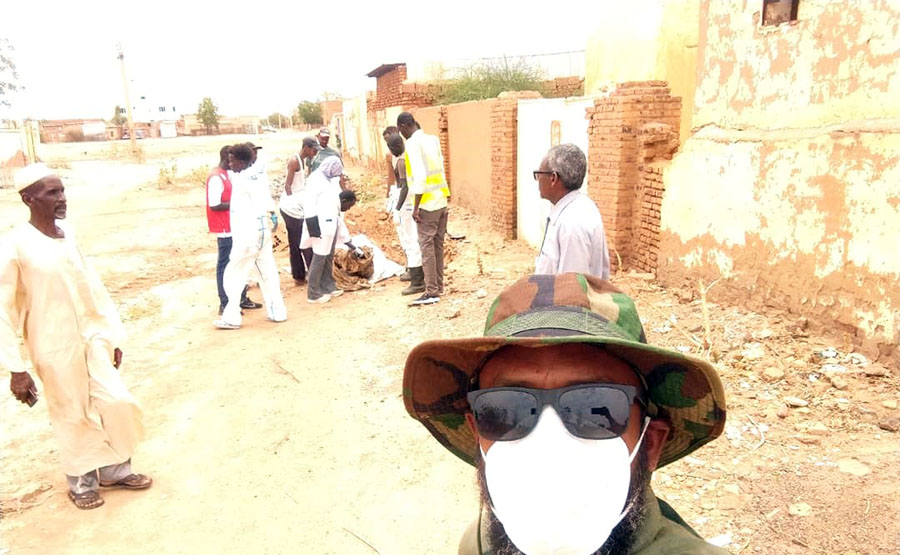
Exhuming Random Graves... Secrets Buried with Corpses
Moatinoon - Al-Haj Youssef
Dead bones, some wrapped in cloth without shrouds, others buried in dirt. Buried among these randomly buried bodies are the secrets and tragic stories of victims whose lives were treacherously taken or buried alive for no fault of their own. Instead of honoring their bodies in a manner befitting human dignity, they were treated in a haphazard manner, devoid of any custom, and inconsistent with the usual funeral ceremonies in urban and rural communities in Sudan, which has witnessed a devastating war between the Sudanese army and the Rapid Support Forces (RSF), upending the balance of life in the country.
The random burials spread throughout the Al-Haj Youssef area, east of the Nile, east of the Sudanese capital, Khartoum, which was the scene of fierce clashes between the army and the RSF, have spread the stench of death everywhere and created environmental hazards that have prompted officials to deal with them with specific precautions. Specialized units were used to exhume the remains and transport them to the main cemeteries in Al-Bandari, Al-Qubba, and possibly Al-Takamul or Wad Dafia.
Sometimes, a single informal grave contains the bodies of more than two women, or a man and a child, and perhaps a group of more than three in what are called mass graves. In the Al-Baraka neighborhood of Haj Youssef, after exhuming graves, 120 bodies were found folded into mass graves and individual graves, possibly inside a house or a garden courtyard.
Exhumation campaigns are continuing in the Haj Youssef Extension squares. On Monday, 12 bodies were exhumed, including two women, in squares 9 and 5 of the Extension, and in the Al-Falah neighborhood, square 1. Forensic medicine and judicial oversight teams are still working to transfer the remaining bodies, which lie in various graves within squares 6, 8, 18, 19, and 20 of the Haj Youssef Extension.
Under the western wall of Al-Nour Boys School in square 20 of the Extension, lies a solitary grave containing the body of Salah, a young man who was treated like prey in the forest by members of the Rapid Support Forces. They shot him in the thigh from a distance, causing him to fall to the ground.
The story goes that the perpetrators pursued him and spoke to him, but he ignored them. They then pierced his back with six bullets, killing him instantly. They left the victim dead and continued searching for eyewitnesses to remove traces of the crime. However, the citizens had disappeared from the streets and roads, even though it was 5:00 PM. Neighborhood residents waited until evening, then carried the body and buried it in the western wall of the school, having made it impossible to reach the Bandari cemetery. Various accounts emerged regarding the cause of his death, but no one knew the truth.
Toto, who lived in the same block, also did not escape the treacherous hands. A group of "support" men opened fire on him and his two companions, who were searching with him for water in the neighboring Block 2. All three suffered varying degrees of injuries from a deadly hail of bullets. The perpetrators left them bleeding to death. Neighborhood residents attempted to rescue them and take them to the Ban Jadid Hospital, but failed to save the lives of two of them. Toto and his second colleague died, while the third survived. However, those who thought they had escaped have yet to reveal the details and motives behind the tragic assassination of his two companions.
In Block 2, adjacent to Al-Ban Jadeed Hospital, one of the most famous hospitals in East Nile, a group of Rapid Support Forces attacked a number of young men in the area. They were forced to sit on the ground, their IDs were humiliatingly searched, and they were accused of several serious offenses.
The young man, "Mohamed," was not carrying his identification papers; he had left them inside the house in front of him. The lack of identification was sufficient reason for them to shoot him in the thigh. The young man bled to death, and his body was buried inside the club (a kindergarten). Strangely, the Janjaweed returned less than a month later to exhume his grave, believing that the residents had hidden quantities of gold and jewelry under the young mans body. They did not find the loot, nor did the residents find the person who sent the false report.
The remains of the dead and the bodies of the victims were found, but will the perpetrators be arrested? Or will these crimes be recorded as unknown, and their secret buried with their perpetrators forever?

